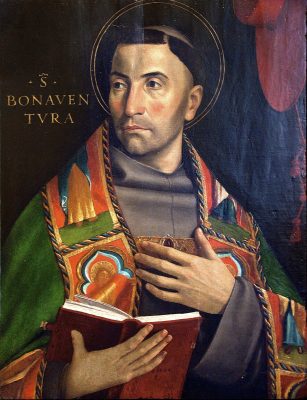12 August 2024
Saint Bonaventure, Part 3 | The Year of Prayer
By Joey Belleza, PhD (Cantab.)
Following our previous look at Bonaventure’s first two stages of ascent in the Itinerarium Mentis in Deum, we now rise to consider the second pair of the seraph’s six wings. Here, noting how the human person is a microcosm of the wider cosmos, Bonaventure explains how the powers of our mind also reflect something of the Creator’s wisdom, but, since we are uniquely made in the image and likeness of God, the similitude between our created faculties and God enjoys a much closer link.
In the third stage, the Seraphic Doctor looks at our process of cognition, or the way we know things. We have, for Bonaventure, the three following faculties. The memory is the faculty which stores and recalls past events. The intelligence or intellect is that by which we understand the nature of things. The will is the faculty by which we choose certain goods and particular actions. Memory precedes and begets intellect; and by remembering things and knowing what they are, we can—by means of the will—choose or not choose certain goods and actions. In this threefold structure of the mind, Bonaventure finds an analogy for the Blessed Trinity. The memory is like the Father, summing up all things in his eternal mind; the intellect is like the eternal Logos or the Son, which is begotten by the memory. Finally, the will is like the Spirit—the love which chooses all things well and in right order. Thus, in the study of the human person’s unique powers—what today we call philosophical anthropology—we discover an even stronger vision of the divine nature.
In the fourth stage, the mind can reflect even more intensely on the beauty of the faith, discovering through its threefold faculties more sets of threefold mysteries which are unfolded with the aid of revelation, scripture, and the Church. For example, let us take a paraphrased quotation from this fourth stage:
The image of our mind must be clothed in the three powers of spiritual wisdom, by which the soul is purified, enlightened, and perfected… So while the soul, believing, hoping, and loving Jesus Christ, who is the incarnate, uncreated and inspired Word—that is to say, the way, the truth, and the life—in faith believes Jesus Christ to be the uncreated Word, which is the Word and splendour of the Father. In hope, [the soul] it yearns to receive the inspired Word. And in love, it embraces the incarnate Word, delighting in Him and entering into Him in ecstatic love.
The significance of this series of threes, rooted in the three powers of the soul which are known by natural reason, is further bolstered by a reflection on the revealed data given through Sacred Scripture and the tradition of the Church. Thus, theology begins to take its place on the ascent to God here, in the fourth stage. “These two middle steps,” says Bonaventure, “through which we enter so as to contemplate God within ourselves, as in the reflections of created images, are like wings, stretched out in order to take flight.” Let us therefore pray for those engaged in the study of anthropology and theology, that in their investigations of things human and divine, they might take flight into a higher knowledge of both man and God. In doing so, may we also come to know the truth about God and man through the one who is himself God-made-man.

